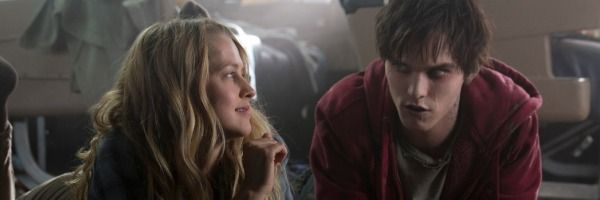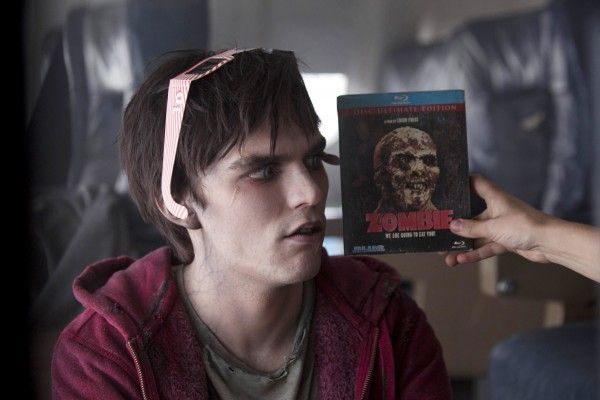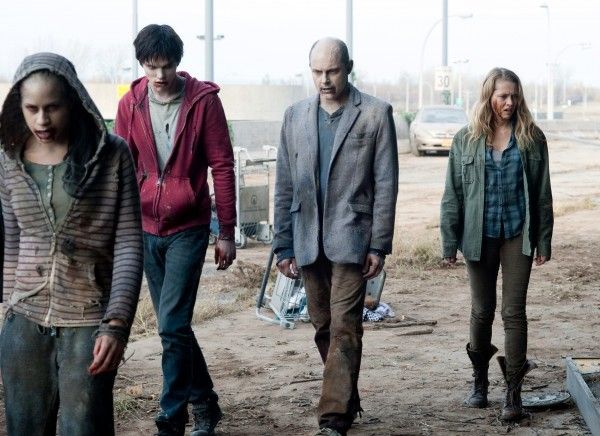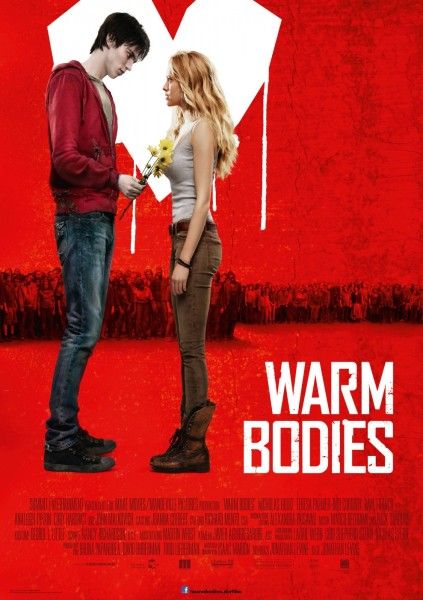In order to keep the zombie genre from rotting, it needs fresh life. 28 Days Later did away with the "z-word" and turned zombification into a virus. Last year, ParaNorman took a compassionate view of the undead by seeing that they were just misunderstood albeit terrifying. Warm Bodies moves in the direction of the latter to the point where it's straining to even be a zombie movie. Instead, Warm Bodies is more of a romance that embraces its reinvention of Romeo & Juliet, but with so much sweetness and charm, it's hard to begrudge the lack of brain-eating or flesh-rotting.
R (Nicholas Hoult) is a zombie whose life (and/or death) is beset with a general malaise. He doesn't enjoy his lot of in life (and/or death), but he finds purpose after devouring the brains of Perry (Dave Franco), getting his memories, and falling in love with Perry's girlfriend, Julie (Teresa Palmer). R kidnaps Julie in order to spend more time with her, and as his heart starts to beat again, she discovers that there may be hope for zombiekind. Meanwhile, R's love begins to spread to other zombies like his friend M (Rob Corddry). However, the love story is caught between the militants led by Julie's father, Grigio (John Malkovich), on one side, and the too-far-gone zombies, called "Bonies", on the other.
Warm Bodies kicks off with a lot of humor as R's voiceover provides a nice commentary on the post-apocalyptic world and his daily life (and/or death). But once Julie enters the picture, director Jonathan Levine shifts his film heavily in the direction of a romance. While it would have been nice to keep the same level of humor, the romance works because Levine makes it completely sweet, lovable, and almost innocent. The innocence almost feels like a necessity since R and Julie moving in a physical direction would raise the question of whether or not Julie is engaging in necrophilia.
But this is the least of the questions raised by the story. I keep using "and/or death", because Warm Bodies isn't completely clear on its rules. The zombies aren't really dead as much as they are brain damaged and cannibalistic. If they were really dead, then they would decay, except they can decay like the bonies. So why does R have scar tissue? Furthermore, R is called "R" because he can't remember his full name, but his voiceover is clever, insightful, and erudite. So are the zombies really brain damaged, or is it simply a matter of being vocally inarticulate?
The film tries to push these issues off to the side, and while the zombie-angle can feel a little thin as a result, its presence mostly succeeds because of a strong subtext. In Warm Bodies, zombies aren't really the dead but the loveless. Levine makes a quick joke about how we're pretty much zombies already as we all stupidly gaze into our phones rather than try to make human connections. As R points out, the bonies are the ones who have just given up entirely, and become nothing but ravenous monsters. If despair can kill the planet, then perhaps love can save it.
That's a totally corny message, but Levine makes it work by finding the right balance of romance with a nice bit of humor. Hoult wonderfully leads the picture despite being restricted by the range of motions and emotions available to a zombie. However, Levine leaves enough room for a performance just as he leaves his picture the space to maneuver through its zombie pretext. Movie monsters should be somewhat threatening, but this is almost as cuddly as zombies can get since they're not really zombies. It's best not to get too hung up on the difference between dead and undead in Warm Bodies. It's more lovable when you see it as the difference between loved and unloved.
Rating: B




